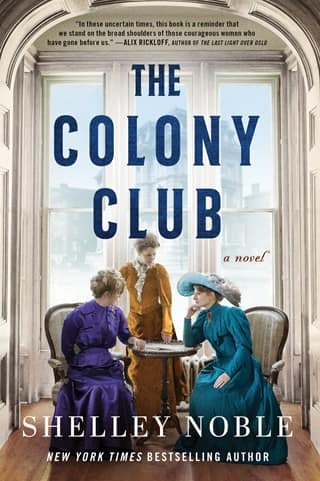Chapter 2
March 1904
Manhattan
Nora Bromley sat at the polished wooden table, her chin propped in her hand as she watched the world grow dark outside the
library window. She was one of the last students to leave the New York School of Applied Design for Women each day. And though
the school was commonly referred to as NYSAD, Nora thought it was an unfair acronym. There was nothing sad about the school.
It was the best thing that had ever happened to her and she spent every moment she could within its high-ceilinged rooms.
A haven of learning cloistered away from the noise and the distractions of the outside world. And, especially in March, the
cold.
She'd finished her last tutoring assignment an hour before. The school had helped her set up sessions with several girls who
needed a little extra help in the architecture division and who could afford individual attention. Nora received a small stipend,
and they let her use the library late to study. Nora was one of the poorer students, just managing to eke out the tuition
fees with the money her father had left for just this purpose.
Money that should have gone to her brother, Jimmy.
Nora drew her attention back to the page she'd been reading. She'd have just enough time to finish this chapter before they
locked the school for the night.
She'd already begun to steel herself for the frigid streets out side after spending hours in the silence and warmth of the library when the door clicked open behind her. The guard was early tonight.
She turned the page and read faster, even as she rose and began to gather her things.
"Ah, I thought it might be you burning the midnight oil."
Not the night guard, but Professor Gerhardt.
"Professor." Nora turned to face him. "I was just finishing this chapter on the new techniques in storied buildings."
"Excellent, excellent."
Professor Gerhardt was a tall man, extremely thin, whose height-to-frame ratio, he often joked, was an architectural miracle.
"I've been meaning to talk to you..."
Nora swallowed and pulled herself up to her full height. Still, she barely reached his top vest button.
"I'm sure you are aware of the competition coming up before the end of term."
"Yes, sir." How could anyone not be? There was a fifty-dollar prize for first place and twenty-five dollars for second. Plus
their entries would be adjudicated by a panel of esteemed architects. A good showing could go a long way toward a promising
career.
"And have you a design you plan to enter?"
"I do have something I've been working on."
"Good, good. I don't have to tell you what will be expected of a winning design. You always do impeccable work." He hesitated.
"May I ask, are you planning to continue your work in architecture once you graduate?"
"Of course, sir. What else would I do?"
He smiled down at her, the lens of his pince-nez catching the light.
"Many of our young ladies opt for marriage—not that you can't do both, mind you... under the right circumstances."
"Meaning if she marries another architect. One who allows her to work by his side."
And most often takes credit for her work , Nora thought.
"As you say. It's a difficult field, but there are successful female architects. It takes determination and an iron will."
"I understand. But I will be an architect." She'd promised. "In fact, I've been studying different firms where I might obtain
a position as a draftsman. At least, an apprenticeship."
"That's just the right attitude. And of course when the time comes, the school will help you enter the job market as we do
with all our promising students."
"Thank you."
"I hope I haven't dissuaded you. I believe you could have a bright future ahead of you."
Nora smiled. "You haven't deterred me in the least."
"Excellent, excellent. Now finish up here before you get locked in for the night. And bundle up well. It's bitterly cold outside.
Good night."
Nora watched him leave, thinking this wouldn't be the worst place to spend the night. Warm and quiet and more space than she
could ever use. But she quickly finished reading her chapter and reluctantly headed downstairs to face the elements and the
two-block walk to the Parker Hotel for Young Working Women, where she shared a room with two other girls.
She tucked her head inside her coat collar and bent into the wind. Her ears hurt from the cold but she refused to tie her
scarf around her head. It reminded her too much of the poor souls who had been their neighbors on Perry Street.
The Parker was a narrow, four-story brick building, too large to be a boardinghouse, but not large enough to offer the amenities of a real hotel. In fact, it had nothing much to recommend it but cheap rooms and adequate fire escapes that ran down the facade like black scars. Nora hurried inside and stood shivering in the entrance hall long enough to take off her mittens. Knowing she wouldn't be receiving any mail, she ignored the bored desk boy and trudged up three flights to the room she shared with two other working girls, Inez, a mannequin at Bonwit Teller, and Lucy, a fancy goods finisher at Macy's.
The climb warmed her a bit, but as soon as she opened the door to her room, she felt the draft seeping under the one window.
The room was dark. She groped for the electric lamp, which gradually lit to reveal just what she'd expected. A mess. Stockings
drying over the radiator, clothes strewn about the floor. There were dirty dishes in the sink that was to be used only for
washing faces and hands, not cooking; three beds, only one made; stacks of magazines that had fallen over and fanned across
the threadbare braided rug.
The small drawing table that sat at the end of Nora's bed was holding not her latest renderings but an empty ginger beer bottle
and several glasses.
She gathered everything up, dropped the items down next to the sink of dishes, and scrubbed off the desktop. When it was thoroughly
dry, she pushed it up against the wall and stuffed a towel into the cracks between the window and the sill. It was still cold,
but a lot better. She shimmied her portable drawing board out from under her bed and balanced it on top of the table, pulled
over a wooden chair, and sat down with her back to the room.
Only then did she unroll the drawing, her latest depiction of the idea she was working on for the competition. She carefully
placed the box of pencils and straightedges to the side, then took a few moments to frown at her work. It was still in its
initial stages, though there had already been several attempts. This sketch was at least closer to what she could see in her
head. But she hadn't managed to transfer it perfectly to lines and arcs and angles.
Maybe she was trying for too much, but if she did manage to win the prize, she wanted to win it with this, her dream of a hospital for tuberculosis patients. She could see it in her mind's eye; a place with light and sun and clean fresh air, surrounded by trees. A place where Jimmy would have been cured.
But this was all wrong. If she situated the rooms so that everyone got light, it made it hard for the staff to move from one
to the other. She drummed her fingers on the drawing board. Unless she... She took her gum eraser and attacked the last
wing she'd just drawn. An octagon , she reminded herself. A central staff desk, with wings radiating in a half circle from it... Her pencil began to fly
just getting the ideas down; she'd do measurements and ratios once the drawing set. And an atrium large enough for the light
to reach the floor. It would save on electricity—because her hospital would have electricity. The Romans had seen the efficacy
of natural light, so she must be on the right track. It was important not to be so forward-thinking that she failed to incorporate
the successes of the past.
Soon the pairs of hose, the crusted dishes, the faint smell of tinned sardines, even the cold faded away as she lost herself
in her design, just as she had in the days when she sat on the floor watching as Jimmy copied the fantastic castles from the
book that Grandpapa Bromley had brought over from the Old Country. Their father, coming in from his work at the tailor's shop, would look over their shoulders and say, "Castles in the air,
eh?" not attempting to hide his pride in his son's talents.
Jimmy would be the first Bromley to go to school. A fine college, maybe.
Jimmy would smile up at him, grasping the bit of pencil in his thin hand, and say, "No, Papa, it's for us to live in. I'll
build it for you and Mama." And their father would smile and turn away before they could see his eyes glisten with unshed
tears.
Now it was up to Nora.
They'd kept Jimmy's sketches in a little wooden box, which they hid under the bed. Drawings on any scrounged scrap of paper, small and large, torn or crumpled, that came their way. Nora had those scraps of paper still, though she no longer had her older brother.
Tuberculosis, they'd said, and she held his hand until Jimmy had gone on to his castles in the air without her.
It was after midnight when Nora turned out the light and climbed into bed. She pulled the covers up to her ears, and lay listening
while the wind howled and rattled the window like an angry collections agent.
Inez and Lucy came traipsing in some time later, giggling and shushing each other to be quiet and only making more noise for
their efforts. Nora had made sure her supplies and clothes were safely stored away before she'd gone to bed, so she pretended
to be asleep until the other two finally called it a night.
Perhaps when she got a job, she would be able to send money to her sister, Louise, and still afford a room at the Y for herself.
A room all her own, where she could have a place for all her things and wouldn't have to worry about them when she was away.
A room of her own. It sounded like heaven, she thought, as she finally slipped into sleep.
Elsie de Wolfe smiled at the audience, taking in the orchestra before lifting her chin to bestow her radiant thank-yous upon
the balcony, even though they were faceless from this distance. Lastly, she nodded to the private boxes, then dipped into
her well-practiced curtsy, lingering for a moment before stepping back as the next actress took her turn.
Her smile fully in control, Elsie listened carefully to see if the applause was louder than hers had been. Not that it really mattered. Mr. Thomas had written the play for the leading man, and for Lionel Barrymore in particular, who was a popular draw. It didn't leave much for the actresses to do. It was, Elsie decided, a fact that she and other actresses often had to put up with.
And they called actresses divas.
Actors could be twice as demanding and usually got what they wanted. It was the way of the world.
And if Elsie had been rather passed over in the reviews—not that Elsie cared about that—it was her part that was to blame.
Still, it was hard to keep smiling when the crowd roared to life, applauding and stamping their feet as Lionel stepped forward,
knowing he was in command of the moment, the reason they had come. The rest of the actors might as well be salt shakers. And
as Elsie stood next to Drina in her drab costume, Elsie knew at least there she outshone them all. Her costume had been made
in Paris. She'd had it designed for the part and shipped to New York before the opening. If she had to play second fiddle
to the star, at least she would do it in haute couture.
No one outshone Elsie de Wolfe's look onstage.
Lionel finally stepped back from his bow and gestured to stage right, where Augustus Thomas, the playwright, was waiting to
take his bow.
He strode onto the stage; clasped his hands as he bowed.
She supposed she should be glad that The Other Girl had proved to be a resounding success. In spite of the initial tepid reviews, the Criterion Theatre had been filled night
after night with enthusiastic theatergoers. They roared with laughter at the cracks and hijinks, gasped at the physical comedy,
and whistled and applauded enthusiastically at the last curtain.
Charles Frohman, who was producing the play, intended to keep it running until June. Which meant Elsie would have to postpone
her trip to France and meet Bessie there later.
The curtain finally closed on the last act, and the cast relaxed on cue, all except Lionel, who was still riding high on his applause. He clapped Augustus Thomas on the shoulder, joked with the stage manager as he made his final exit for the evening. He would have friends waiting in his dressing room, fans waiting at the stage door, more friends and fans waiting at whatever restaurant he was dining at that evening.
Elsie replaced the bouquet the actresses were presented with after each performance on the prop table. They would be collected
and transferred to refrigeration to be used again the following evening. Did anyone ever guess that after the first few nights,
the flowers lavished on the ladies night after night were actually repeats?
She headed to her dressing room, delicate, graceful, reminding herself to not let down until the door closed behind her and
she was alone with her dresser, a girl named Clovis, of all things, who spoke with a lisp when she spoke at all.
Just as well; Elsie didn't want to hear what she might say. She turned her back to the girl and let her undo her gown. A gown
she'd paid for herself.
Clovis helped her into her dressing gown of black silk, embroidered with giant white peonies, and hurried away with the costume.
Elsie sat at her dressing table, reaching for the cold cream without even having to look, watching her face in the mirror
for any sign of defeat, of failure, of...
There was a knock at the door. Friends. Fans. Elsie put down the cold cream. How silly she had been. She was a star, beloved, and on her way to the top. She straightened
her shoulders, smiled at her image in the mirror, and called out, " Mes amis. Entrez, s'il vous plait. "
"That was delightful," said Daisy as the curtain lowered on the evening's performance of The Other Girl . She'd suggested the play because Bessie Marbury's companion, Elsie de Wolfe, was starring in it. They were both members of the Colony Club and had waxed enthusiastic about the play that had just opened at the Criterion Theatre.
Daisy had enjoyed it immensely, her thoughts rarely straying to her plans for the Colony Club as they had at the opera last
week. Even Caruso hadn't been able to keep her mind from churning over ways to push the construction of the clubhouse along.
It seemed to occupy her mind constantly these days.
"Lionel Barrymore certainly knows how to entertain," said Bordie, perusing his program.
"He does," Daisy agreed.
"And your friend Elsie was quite lovely."
"She was," Daisy said distractedly. She'd just caught sight of Bessie in the orchestra talking to two gentlemen, one of whom
was Charles Frohman, the producer of the play. Probably making another deal; Bessie never lost a chance to mix business with
pleasure.
"Though I must say..." Bordie continued, "she didn't have much of a part; actually—"
"No," Daisy agreed, preempting him from stating the obvious. Elsie might be the best-dressed actress on the Rialto, but her
acting was less than inspiring. At least with Bessie as her agent, she shouldn't have trouble continuing to get parts.
"You seem distracted, my dear. You're not still stewing over what James Barclay said during the intermission, are you?"
"About how the building site for the clubhouse is still lying empty for over a year after acquiring the property? I haven't
given it a thought."
Bordie chuckled and helped her into her coat, a lovely green velvet with a mink collar that he'd given her for Christmas.
"Of course you haven't."
"But if one more person comments on the slow progress of the building... Well, they just don't understand the difficulties
of getting a good architect."
"Stanford White turn you down?"
Daisy adjusted her collar. "It's not that he's turned us down; he just puts us off."
"He didn't look well the last time I saw him. Everyone is saying..." Bordie's next words faded away. Bessie was headed
backstage, Frohman and the other gentleman following in her wake as if she were the star of the evening and they had just
signed on the dotted line.
As soon as the door closed behind the trio, Daisy turned to Bordie. "The ladies have decided they want Stanford White and
Stanford White they shall have."
And first thing Monday morning she would pay a call on Bessie Marbury. If anyone could clinch the deal, it was Bessie.
 Fullepub
Fullepub 



